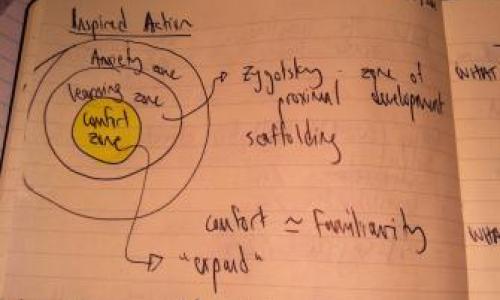
Not that long ago, I wrote a post about rejection and how, in addition to being an unfortunate reality of the job search process, it tends to discourage risk taking, which is one of those things you kind of have to do in order to find a good job. Here's an excerpt:
"The trick is to try to forget how painful rejection truly is. If we forget, we’ll inevitably try again, and most likely be rejected again at some point, but there will almost certainly be some successes in there somewhere too. Stop learning from rejection, because that leads to fear of taking risks, and risks are a necessary part of career growth. I’m happy to say that the story of my romantic life went from being full of rejection to full of happiness, because I never "learned" that getting my heart trampled on continuously by romantic interests wasn't worth the pain. Embrace that same ignorance of rejection in your career. One day, you just might find the one you've been looking for all along. The ones that got away were just never meant to be."
It's something I've since wanted to revisit, but only recently felt inspired to do so. Rejection is often described metaphorically as a sting, which is apt in many ways. First, due to the fact that it hurts. No matter how well you've prepared for it, rejection hurts on a gut-wrenching , tear-jerking scale. Why does it hurt so much? Perhaps more importantly, how can we deal with it? I can think of two main conceptualizations of rejection, and some tips for dealing with it to go with each.
Rejection As Destruction Of Hope
Imagine you've just applied for a job. Regardless of how optimistic you are about your chances, it's safe to say that you have at least some small measure of hope, else you wouldn't have applied for it. As time passes and you don't hear anything back, that hope begins to wane. Finally, when you learn that the opportunity has gone, that you have been rejected, any remaining hope you had for that opportunity goes with it. In the moment of rejection, hope is destroyed. The "sting" is a feeling of true hopelessness.
The good news about hope is that it's resilient. Hope can exist even in the most desolate of situations. Hope depends on nothing. Hope is the last of our human freedoms. As famous psychotherapist and holocaust prison camps survivor Viktor Frankl put it,
“everything can be taken from a man [sic] but one thing: the last of the human freedoms—to choose one’s attitude in any given set of circumstances, to choose one’s own way.”
Tips for increasing hopefulness:
-
Slow down and ask yourself: Can I choose to react differently right now?
-
If not, it might help to view your pain as a choice: you are consciously allowing yourself to feel bad at that point in time, and that pain serves a helpful purpose - letting you retreat and eventually regroup. Indulge yourself if you need to.
-
Frankl famously said that despair = suffering without meaning. Look for any fragment of meaning you can find in your suffering.
-
Hope is infectious. What activities and practices in your life give you a sense of hope?
Rejection As Fuel For Inner Critic
We all have one, and know it well. The voice in your head that seems to say, "you're not good enough, and here are all the reasons why!" The inner critic leaps at opportunities like this to show evidence for its self-esteem-diluting beliefs. Normally, this critical voice is but one of many aspects of ourselves that, together, form our self-concept. In moments of rejection though, the critic seems to take total control. We lose every other perspective, and are forced not only to face one failure, but an entire view of ourselves as incompetent, incapable, and "less than."
Tips for softening your inner critic:
-
Start by externalizing your critic. Remind yourself that it is only one part of yourself, not all parts. Imagine it as a separate person. What does it look like? Who does it remind you of?
-
It might be easier to see now that your critic is proposing an argument. Who is it arguing with? What is that other part of you like? We'll call this your "experiencing self."
-
Strengthen your experiencing self by thinking of counters to your critic's arguments. What are some exceptions to its nefarious claims?
-
Ask yourself what purpose your inner critic serves. It's a part of you like any other, and its misguided function is to protect you from risk or harm. Only, it does so in rather dysfunctional, ego-deflating ways. After being rejected, you might feel like you need to be protected for a bit. How can you do that in other ways? Removing this need for your critic may "convince it" to go away.
How do you deal with rejection? Do you view it differently than my "theories" above? I'd love to hear your thoughts!
















